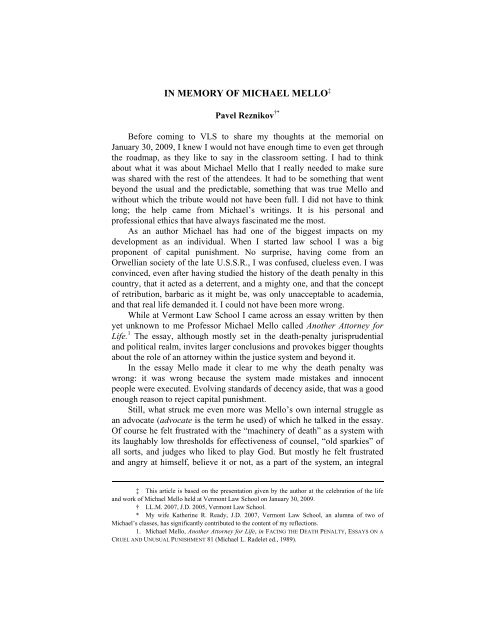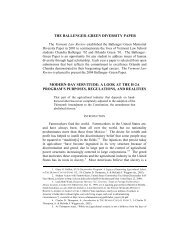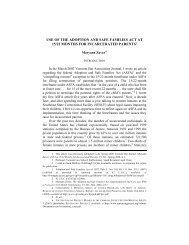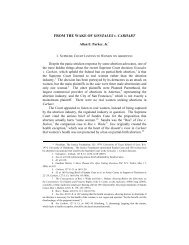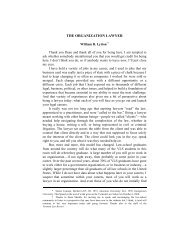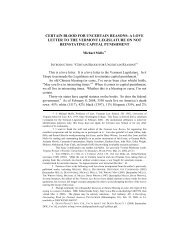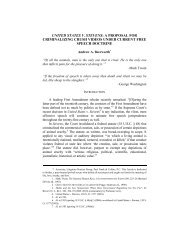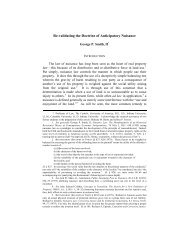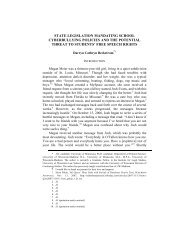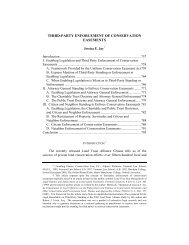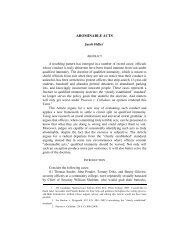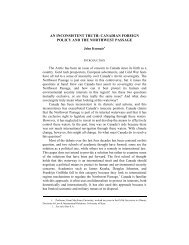In Memory of Michael Mello Pavel Reznikov - Law Review - Vermont ...
In Memory of Michael Mello Pavel Reznikov - Law Review - Vermont ...
In Memory of Michael Mello Pavel Reznikov - Law Review - Vermont ...
You also want an ePaper? Increase the reach of your titles
YUMPU automatically turns print PDFs into web optimized ePapers that Google loves.
IN MEMORY OF MICHAEL MELLO ‡<br />
<strong>Pavel</strong> <strong>Reznikov</strong> †*<br />
Before coming to VLS to share my thoughts at the memorial on<br />
January 30, 2009, I knew I would not have enough time to even get through<br />
the roadmap, as they like to say in the classroom setting. I had to think<br />
about what it was about <strong>Michael</strong> <strong>Mello</strong> that I really needed to make sure<br />
was shared with the rest <strong>of</strong> the attendees. It had to be something that went<br />
beyond the usual and the predictable, something that was true <strong>Mello</strong> and<br />
without which the tribute would not have been full. I did not have to think<br />
long; the help came from <strong>Michael</strong>’s writings. It is his personal and<br />
pr<strong>of</strong>essional ethics that have always fascinated me the most.<br />
As an author <strong>Michael</strong> has had one <strong>of</strong> the biggest impacts on my<br />
development as an individual. When I started law school I was a big<br />
proponent <strong>of</strong> capital punishment. No surprise, having come from an<br />
Orwellian society <strong>of</strong> the late U.S.S.R., I was confused, clueless even. I was<br />
convinced, even after having studied the history <strong>of</strong> the death penalty in this<br />
country, that it acted as a deterrent, and a mighty one, and that the concept<br />
<strong>of</strong> retribution, barbaric as it might be, was only unacceptable to academia,<br />
and that real life demanded it. I could not have been more wrong.<br />
While at <strong>Vermont</strong> <strong>Law</strong> School I came across an essay written by then<br />
yet unknown to me Pr<strong>of</strong>essor <strong>Michael</strong> <strong>Mello</strong> called Another Attorney for<br />
Life. 1 The essay, although mostly set in the death-penalty jurisprudential<br />
and political realm, invites larger conclusions and provokes bigger thoughts<br />
about the role <strong>of</strong> an attorney within the justice system and beyond it.<br />
<strong>In</strong> the essay <strong>Mello</strong> made it clear to me why the death penalty was<br />
wrong: it was wrong because the system made mistakes and innocent<br />
people were executed. Evolving standards <strong>of</strong> decency aside, that was a good<br />
enough reason to reject capital punishment.<br />
Still, what struck me even more was <strong>Mello</strong>’s own internal struggle as<br />
an advocate (advocate is the term he used) <strong>of</strong> which he talked in the essay.<br />
Of course he felt frustrated with the “machinery <strong>of</strong> death” as a system with<br />
its laughably low thresholds for effectiveness <strong>of</strong> counsel, “old sparkies” <strong>of</strong><br />
all sorts, and judges who liked to play God. But mostly he felt frustrated<br />
and angry at himself, believe it or not, as a part <strong>of</strong> the system, an integral<br />
‡. This article is based on the presentation given by the author at the celebration <strong>of</strong> the life<br />
and work <strong>of</strong> <strong>Michael</strong> <strong>Mello</strong> held at <strong>Vermont</strong> <strong>Law</strong> School on January 30, 2009.<br />
†. LL.M. 2007, J.D. 2005, <strong>Vermont</strong> <strong>Law</strong> School.<br />
*. My wife Katherine R. Ready, J.D. 2007, <strong>Vermont</strong> <strong>Law</strong> School, an alumna <strong>of</strong> two <strong>of</strong><br />
<strong>Michael</strong>’s classes, has significantly contributed to the content <strong>of</strong> my reflections.<br />
1. <strong>Michael</strong> <strong>Mello</strong>, Another Attorney for Life, in FACING THE DEATH PENALTY, ESSAYS ON A<br />
CRUEL AND UNUSUAL PUNISHMENT 81 (<strong>Michael</strong> L. Radelet ed., 1989).
624 <strong>Vermont</strong> <strong>Law</strong> <strong>Review</strong> [Vol. 33:623<br />
and necessary part, but still a part <strong>of</strong> the system <strong>of</strong> legal homicide. That is<br />
why he ultimately quit deathwork. He did not want to help to provide<br />
“sanitized,” as he put it, executions. As an attorney, he did a great job<br />
representing and defending his clients, and met every pr<strong>of</strong>essional<br />
standard above and beyond; it was himself as a human being that he set<br />
different, higher ethical standards for. As a human being, he refused to<br />
support “the aura <strong>of</strong> legalism” and “appearance <strong>of</strong> fairness.” That was<br />
quintessential <strong>Mello</strong>.<br />
Thus, even a bigger revelation to me was this: being on the right side <strong>of</strong><br />
the law does not always equal being on the right side. Sometimes personal<br />
ethics override (should override) an otherwise legitimate and necessary,<br />
even integral and lawful position. For me, an aspiring lawyer, who just<br />
recently came from a country whose entire body <strong>of</strong> law a few years ago was<br />
written in Newspeak, that revelation was significant, to say the least; the<br />
best system in the world—the adversary system—does not always work,<br />
even when it runs like a well-oiled machine. Hence, to me the double<br />
meaning <strong>of</strong> the name <strong>of</strong> the essay—another attorney against the death penalty<br />
or another attorney for the rest <strong>of</strong> one’s life—carries the utmost significance.<br />
<strong>Mello</strong> used the word attorney in the original sense <strong>of</strong> the word—<br />
advocate, which in turn carried a sense <strong>of</strong> a higher purpose: being <strong>of</strong> help to<br />
someone less advantaged, and not in today’s MPRE sense <strong>of</strong> what one can<br />
get away with. Thus for <strong>Mello</strong>, the role <strong>of</strong> an attorney implied, absolutely<br />
and necessarily it did, higher ethical standards <strong>of</strong> an advocate.<br />
<strong>In</strong> Dead Wrong, A Death Row <strong>Law</strong>yer Speaks Out Against Capital<br />
Punishment, 2 <strong>Michael</strong> tells about his days as a law clerk to Judge Robert<br />
Vance <strong>of</strong> the United States Court <strong>of</strong> Appeals for the Eleventh Circuit. To<br />
describe Judge Vance as a person and as a jurist, <strong>Mello</strong> uses Aristotle’s<br />
notion <strong>of</strong> practical wisdom, which he describes in such terms as pragmatism<br />
and common sense. He talks about practical wisdom as good judgment, the<br />
exercise <strong>of</strong> which requires experience and reflection and which is<br />
comprised <strong>of</strong> qualities <strong>of</strong> character and experience, and methods <strong>of</strong><br />
deliberation. Such practical wisdom is also what described <strong>Michael</strong> himself.<br />
Common sense, humility, openness, appropriateness (read<br />
pr<strong>of</strong>essionalism), empathy, politeness—all <strong>of</strong> those were parts <strong>of</strong> <strong>Michael</strong>’s<br />
practical wisdom. Judge Vance, himself against the death penalty, was<br />
assassinated by a mail bomb sent to his home a few days before Christmas<br />
in 1989. Alabama state prosecutors tried to go for the death penalty; <strong>Mello</strong><br />
continued to fight the system in the courtroom and in the classroom.<br />
2. MICHAEL A. MELLO, DEAD WRONG: A DEATH ROW LAWYER SPEAKS OUT AGAINST<br />
CAPITAL PUNISHMENT (1997).
2009] <strong>In</strong> <strong>Memory</strong> <strong>of</strong> <strong>Michael</strong> <strong>Mello</strong> 625<br />
<strong>In</strong> the classroom <strong>Michael</strong> always treated us students with respect and<br />
dignity, no matter how baseless our statements could be (e.g., when we would<br />
use Fifth and Sixth Amendment right to counsel interchangeably). He did not<br />
assume anything about us, never raised his voice, always had time for us,<br />
and was always considerate <strong>of</strong> our personal circumstances. He always<br />
listened, and was always honest with us, as he was at all times extremely<br />
pr<strong>of</strong>essional, and again, first and foremost, respectful. He never imposed his<br />
views on us; he was accepting, tolerant, and open to differing viewpoints; he<br />
never intimidated, and never tried to make us feel uncomfortable.<br />
Many educators today see it as a must to get through a study plan,<br />
cover all the bases, and hit all major points, <strong>of</strong>tentimes at the expense <strong>of</strong> the<br />
quality <strong>of</strong> the learning process. They don’t bother to take a step back and<br />
have a conversation about the reasons behind the rules. The truth is that a<br />
computer program can teach a class based on a bullet-points approach; a<br />
commercial outline and a bunch <strong>of</strong> CDs do the job just fine. The Model<br />
Penal Code can be programmed in one’s brain by repetition. One does not<br />
need to go to law school to study law for the bar and to pass it.<br />
But computer programs, fancy outlines, and mindless drills would<br />
never be able to teach how to assess a larger picture; to see a forest, not just<br />
a bunch <strong>of</strong> tree trunks; to recognize a conflict; and to seek out solutions<br />
from a larger, real-life perspective. Not every pr<strong>of</strong>essor, regardless <strong>of</strong> how<br />
bright and accomplished, can do that. <strong>Mello</strong> could. <strong>In</strong> fact, he did it so well<br />
that learning the black-letter law came naturally and easily after underlying<br />
principles were dissected.<br />
After I left VLS in late 2006, I wrote Pr<strong>of</strong>essor <strong>Mello</strong> a note thanking<br />
him for the learning experience I had in his classroom. A few days later I<br />
received a reply, which, in part, said:<br />
Thank you for your lovely note <strong>of</strong> Jan. 3 and your kind words. I<br />
simply loved having you and Katie in my classes. You added<br />
more than you can possibly realize. Please do keep in touch. Let<br />
me know if I can ever be <strong>of</strong> assistance to you. I’ll miss your<br />
voice, background, and viewpoint at VLS.<br />
<strong>Mello</strong> died on my birthday, but as always, considerate as he was, I did<br />
not learn the news until the next morning.<br />
Richmond, VA<br />
February, 2009


